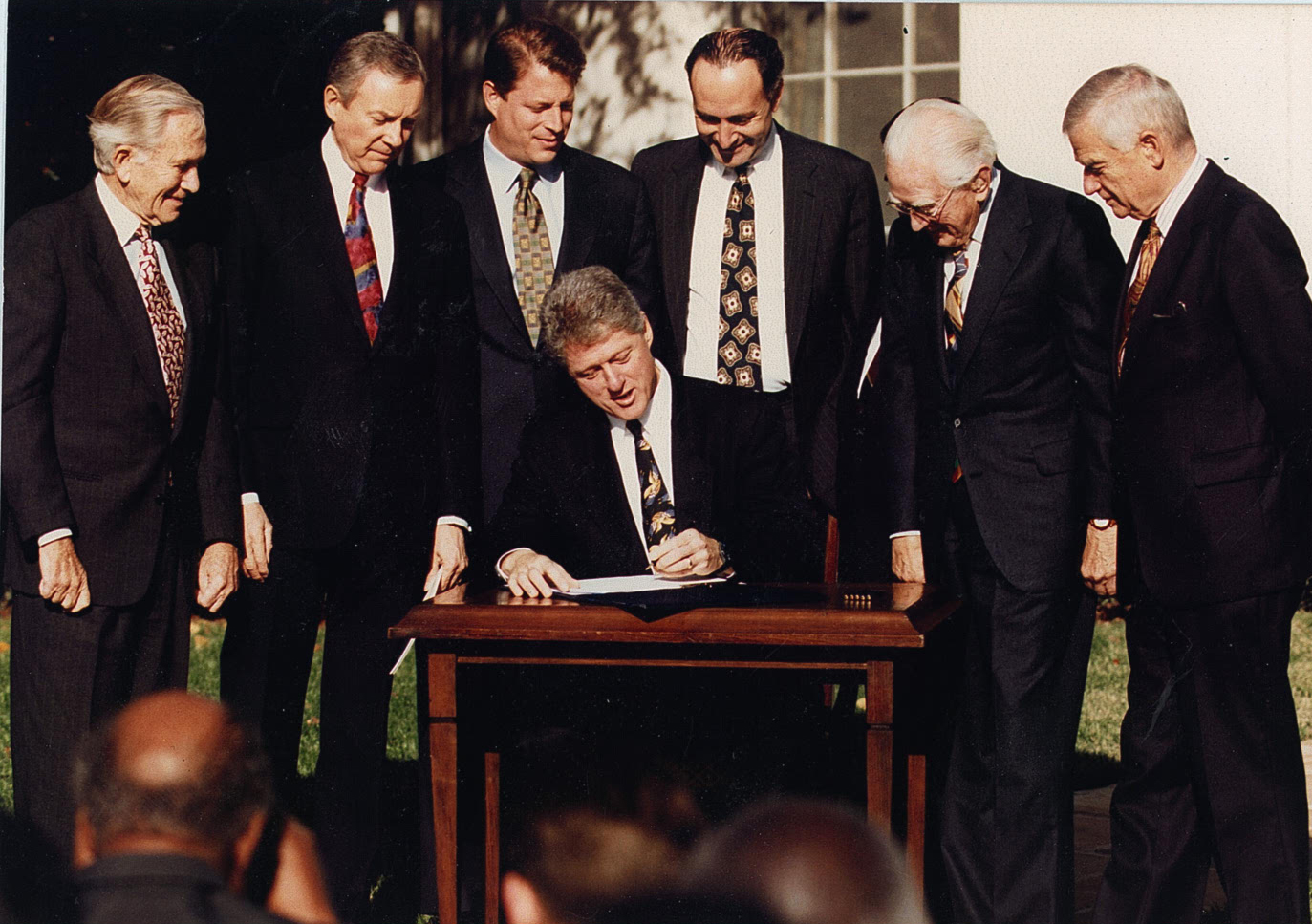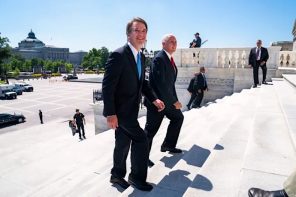At a Congressional briefing on religious freedom last week (4/23) Rep. Bobby Scott, a Virginia Democrat, fired an opening salvo in what promises to be an uphill battle for civil liberties, church-state separation, women’s, and LGBT rights advocates: amending the federal Religious Freedom Restoration Act to reverse the ways in which it has been used to undermine the rights of third parties and avoid compliance with anti-discrimination laws.
Citing the Supreme Court’s 2014 decision in Burwell v. Hobby Lobby, the proliferation of expanded RFRAs at the state level, and a Department of Justice policy that permits taxpayer-funded, religious social services providers to discriminate based on religious beliefs in hiring and firing staff, Scott worried that RFRA “could be used to trump anti-discrimination laws.”
“It’s clear,” said Scott, “that it’s time for Congress to examine the overreach of RFRA.”
RFRA, enacted in 1993 as a fix to protect the rights of religious minorities, has now been expanded beyond its original intent, these critics say. As interpreted by the Supreme Court, particularly in Hobby Lobby, and by federal government agencies that use RFRA to grant religious exemptions to federally-funded faith-based social service providers, the application of RFRA has now exceeded its purpose—to protect citizens from government actions that “substantially burden” their religious practice.
Critics say the “substantial burden” standard has been too generously interpreted, extending RFRA’s protections to situations the statute was never intended to cover. Even worse, RFRA critics say, the law was never intended to be applied in ways that actually deprive third parties of their rights.
They critique the Court’s decision in Hobby Lobby, for example, for making it harder for women to access the cost-free contraception coverage required under the Affordable Care Act. And at the federal agency level, critics say that officials have permitted religious organizations funded by the faith-based initiative (started under George W. Bush and continued under President Barack Obama) to discriminate in hiring—or to refuse to provide services they find religiously objectionable.
While these critics would like to see Congress amend the statute to clarify its scope, few expect a Republican Congress with deep ties to the religious right to take up an amendment to RFRA—even one narrowly tailored to alter the impact of Hobby Lobby. And even Democrats are skittish about questioning RFRA for fear of being perceived as opposed to religion or religious freedom.
But there is one RFRA expansion that these critics say President Obama can fix on his own.
Discrimination With Taxpayer Money
Civil liberties advocates have tried for years to persuade Obama to make good on a campaign promise to end hiring discrimination by federally-funded faith-based organizations, to no avail.
Instead Obama has continued a policy, laid out in a 2007 Justice Department Office of Legal Counsel memo, known as the World Vision Memo, that says that under the Religious Freedom Restoration Act, federally-funded religious social service organizations can request an exemption from legal requirements prohibiting discrimination in employment.
A Christian organization may hire only Christians, in other words, if it so chooses—as is the case with World Vision, one of the biggest faith-based charitable organizations in the country.
According to the memo, “a faith-based grantee’s hiring preference for staff who share its religious identity and mission must be permitted” if the grantee’s services provided under the contract constitute an exercise of its religion and it “demonstrates that requiring it to either forgo its religious preference in hiring or else forgo the federal funding would substantially burden that exercise of its religion.”
As a result, the Obama administration has allowed exempted religious organizations to, for example, refuse to hire an applicant who does not subscribe to their faith, or to fire a lesbian or single mother based on religious objections. The Justice Department has explicitly applied this reasoning to faith-based providers receiving funding under the 2013 reauthorization of the Violence Against Women Act, even though VAWA specifically prohibits employment discrimination.
Last year, a coalition of over 90 civil liberties, religious, health, women’s, and LGBT advocates again called on the Obama administration to reverse the World Vision Memo, calling it
one of the most notable examples of the Bush Administration’s attempt to impose a constitutionally erroneous and deeply harmful policy—RFRA should not be interpreted or employed as a tool for broadly overriding statutory protections against religious discrimination or to create a broad free exercise right to receive government grants without complying with applicable regulations that protect taxpayers.
The Rev. Barry Lynn, executive director of Americans United for the Separation of Church and State, who moderated the congressional briefing, called Obama’s refusal to reverse the World Vision Memo “the deepest stain on the civil rights position of the Obama administration.”
Citing the World Vision Memo, the U.S. Conference of Catholic Bishops (USCCB), which along with other Catholic entities, has tens of millions of dollars worth of federal contracts each year, is objecting to new proposed regulations under an Executive Order, amended by President Obama in July 2014, to bar all federal contractors from discriminating on the basis of sex or gender identity.
These new regulations will apply across all government agencies and will affect a wide range of contracts the government has with faith-based providers.
The USCCB argues that denying a faith-based organization a federal contract over its refusal to comply with the anti-discrimination rules could be a violation of RFRA. The new anti-discrimination regulations, the USCCB argues:
are problematic in at least four respects. They (1) require employer-sponsored health plans in some instances to include coverage of abortion; (2) require such plans to include coverage of contraceptives; (3) forbid discrimination against employees because they are in “a relationship with a person of the same sex,” and (4) forbid discrimination on the basis of “gender identity” or “transgender status.”
RFRA, the bishops claim, prohibits the application of these requirements to religious organizations contracting with the federal government if they have religious objections to abortion, contraception, or homosexuality.
The USCCB did not respond to a request for comment about the extent of its own contracts that will be affected by the new regulations, or what it will do if not granted an exemption through the regulatory process.
Douglas Laycock, a law professor at the University of Virginia and a proponent of a robust reading of RFRA, said via email that the new sex discrimination rules under the Executive Order are “about regulating the religious charity’s employment practices as a condition of eligibility for government contracts,” and could present a RFRA claim.
But Daniel Mach, director of the American Civil Liberties Union (ACLU) Program on Freedom of Religion and Belief, said RFRA “should not be invoked to discriminate or harm others, especially in context of government-funded social services.” The government, Mach said, “has a vital interest in preventing discrimination in taxpayer-funded jobs.”
Applying the World Vision Memo Beyond Hiring
Although on its face it applies only to faith-based grantees’ hiring practices, the World Vision Memo could be used to argue for religious discrimination against beneficiaries of those grantees’ social services programs, said Ira Lupu, a law professor who has studied the faith-based initiative, and who argues RFRA is unconstitutional.*
The USCCB, joined by Catholic Relief Services, World Vision, the National Association of Evangelicals and its humanitarian arm, World Relief, have raised a RFRA objection to referring clients for reproductive health services in federally-funded programs that serve unaccompanied immigrant children and refugees.
The USCCB and its allies recently laid out this argument in comments objecting to new proposed regulations under the Prison Rape Elimination Act, which would require federal grantees, including those caring for unaccompanied immigrant children, to provide rape victims in their custody with “timely” and “unimpeded” access to emergency contraception and “all lawful pregnancy-related medical services,” which would appear to include abortion. The proposed regulation is due to take effect in June.
The proposed regulation, the USCCB says,
falls short of adequately protecting existing and prospective grantees, contractors, subgrantees and subcontractors with religious or moral objections to providing, facilitating the provision of, providing information about, or referring or arranging for, items or procedures to which such organizations have a religious or moral objection.
The bishops’ objections to the proposed regulations represent another chapter in a protracted standoff between the ACLU and the Department of Health and Human Services, between the USCCB and HHS, and—most visibly to the public—between Republicans and Democrats as conservatives’ religious freedom campaigns have been increasingly politicized over the past four years.
In 2011, during the peak of the Republican presidential primary and as the USCCB-led campaign for religious freedom escalated over the contraception coverage required under the Affordable Care Act, conservatives accused the Obama administration of being “anti-Catholic” because HHS began requiring contractors serving victims of sex trafficking to refer them for a “full range of reproductive health services.”
In 2009, the ACLU had sued HHS over the older policy, charging that the government violated the Establishment Clause when it allowed the Bishops to refuse to refer clients for contraception and abortion services. In 2012, a federal court ruled that such an exemption was an unconstitutional violation of the Establishment Clause because it allowed a religious organization to “impose religiously based restrictions on the expenditure of taxpayer funds,” thus constituting a government endorsement of a particular religious view.
Although that decision was later ruled moot because HHS had changed its policy and did not renew the USCCB’s contract (provoking the Republican accusations of anti-Catholic bias), the ACLU maintains the legal reasoning still applies. If it does, the ACLU argues, the bishops’ claims that the new Prison Rape Elimination Act regulations violate RFRA would not prevail, since RFRA cannot trump the Constitution.
“It’s a stretch to argue, as they do, that they are entitled to take a multi-million dollar government contract and then refuse to do the work required under the contract, and if they don’t get the contract, it would be a violation of their religious beliefs,” said Brigitte Amiri, a senior staff attorney with the ACLU’s Reproductive Freedom Project. “If they don’t want to provide the care that’s required under the contract,” she added, “they shouldn’t compete for the contract.”
Laycock also raised questions about the viability of the bishops’ RFRA argument. He said via email, “RFRA does not require government to manage its affairs to conform to any private citizen’s religion.” As a result, the government can specify what services it wants contractors to provide, without violating their religious rights. “And if that includes some service that Catholic Charities can’t provide,” Laycock added, “then Catholic Charities won’t bid on that contract.”
Marci Hamilton, a law professor at Cardozo School of Law, and a critic of RFRA and religious exemptions, added that unlike in Hobby Lobby—where the Court noted that even if women could not obtain cost-free contraception coverage through their employer’s health plan, they could still purchase contraception—unaccompanied immigrant children in custody don’t have that freedom.
In addition, Hamilton said, “rape is different” from access to contraception. “Courts have not had a chance to do the weighing of a victim of sexual assault versus the religious claims of an organization.”
Hampered By Lack of Transparency
The legal issues involved here are further complicated by the government’s failure to be transparent about how these taxpayer-funded contracts are carried out on a day-to-day basis.
Since the Bush era, civil liberties advocates have been frustrated by an absence of transparency about the extent of faith-based contracts, and the extent to which contractors were not following the law—whether pertaining to employment discrimination, proselytizing, or other constitutional concerns.
Lupu said that transparency has long been a problem—not just in finding out which providers are discriminating in hiring, but in simply discovering the extent of faith-based providers receiving federal funds. “It’s a really good question, what happens in that process. Nobody knows,” said Lupu.
When I wrote about the unaccompanied immigrant children issue in 2013, I found that advocates for these children’s rights were stymied in their efforts to find out whether victims of rape in the custody of religiously affiliated organizations that contract with HHS were receiving the health care they needed—and are entitled to under a 1997 settlement agreement in Flores v. Reno, which requires, among other things, that these children have access to family planning services.
In the ACLU’s lawsuit against HHS, the USCCB asserted in a sworn affidavit that it did not refer these minors in its custody for services that it objected to on religious grounds, like contraception and abortion. In responses to my inquiries, HHS maintained it was ensuring compliance with all legal requirements pertaining to the treatment of unaccompanied children, including the Flores Agreement.
Earlier this month, the ACLU filed a lawsuit under the Freedom of Information Act against HHS. The agency, the ACLU alleges, has not responded to its request for documents dealing with the administration of the agency contracts with the USCCB to serve unaccompanied minor children and refugees. Through its FOIA suit, the ACLU seeks answers to whether, and to what extent, HHS has granted exemptions, or looked the other way if the USCCB will not refer its clients for required reproductive health services, or if it arranged for access to these services through other means.
About the ACLU’s FOIA suit, a spokesman for the Administration for Children and Families said the agency “is gathering documents to complete the requests in an expeditious manner that aligns with FOIA procedures.”
The USCCB did not respond to requests for comment on the FOIA suit.
For advocates of broad religious exemptions, that the government would require an objecting florist to create floral arrangements for a same-sex wedding, or, in the case of Hobby Lobby, require businesses to cover contraception in their health insurance plans, is part of the same infringement of rights as a government requirement that Catholic Charities refer a 14-year-old rape victim to a health care provider to obtain emergency contraception, or requiring religious federal contractors to comply with sex and gender anti-discrimination laws.
But there are signs that critics of such an interpretation of RFRA are gearing up for a prolonged campaign to undo RFRA’s expanding reach.
“It’s a long-term strategy,” said Gretchen Borchelt, Vice-President for Health and Reproductive Rights at the National Women’s Law Center. “The more we talk about the ways these laws are used to harm others, the more support we get to fix them.”
* Clarification: Lupu has argued that RFRA was unconstitutional as applied to the states, which the Supreme Court ultimately held in City of Boerne v. Flores, and that it can be applied in unconstitutional ways, such as in Hobby Lobby.






